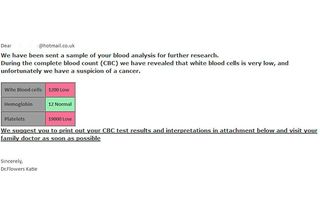Dear [your name here], we suspect you might have cancer...
We can't believe even online scammers would stoop this low!

News of the latest terrible email scam has left us open-mouthed in the office this morning, when we heard that emails are circulating to tell people they have cancer (yes, you read that correctly) in order to trick them into downloading a virus onto their computer...
We all know there's nothing more annoying than receiving an email into your inbox that you thought was genuinely intended for you, only to find out that it's some annoying spam. Worse still when you've been sent a virus and it's played havoc with your emails or computer. Now just think how you'd feel if you received an email saying that a seemingly-legitimate health board suspects you might have cancer...
Take a second to just imagine what would go through your mind when receiving an email supposedly from the United Kingdom's National Institute for Health and Care Excellence (NICE) telling you that a sample of your blood analysis has been sent for further research, and as your white blood cells are low and they suspect cancer.
And then imagine how you'd feel if you'd only been for a blood test very recently.
This is exactly what happened to our Social Media Manager Lissa's mum Ros, when she became one of the targets of a particularly vicious cybercriminal email campaign. Ros was understandably left incredibly frightened and upset as she'd very recently undergone a blood test and therefore feared the worst. And after all, what sort of cybercriminals would stoop this low?

The vicious email that one goodtoknower's mum recieved that left her fearing the worst
What to look out for
The malicious emails appear with the subject line 'IMPORTANT: blood analysis results' and say they come from no_reply@nice.org.uk. And what is all this in aid of? Well, the email goes on to ask you to ‘print out your CBC test results and interpretations in attachment below and visit your family doctor as soon as possible.' However the file attached isn't a test result, but a virus that's designed to steal passwords and other sensitive information from your computer.
GoodtoKnow Newsletter
Parenting advice, hot topics, best buys and family finance tips delivered straight to your inbox.
NICE is aware of this nasty spam and has posted the following message on their website: ‘NICE is aware that a spam email is being sent to members of the public regarding cancer test results. Please be assured that this email is not from NICE and we are currently investigating its origin. If you have received the email, do not open the attachments.'
Of course if you do receive this email then don't open it, and if you have and your computer hasn't detected the virus then you may need to update your computer anti-virus and run a full scan.
Where to next?
-How to avoid being scammed online
-10 symptoms you should never ignore
-Take our healthy heart quiz
-
 Why do I crave sugar? Causes of sugar cravings and how to stop them
Why do I crave sugar? Causes of sugar cravings and how to stop themIf you're someone who suffers from sugar cravings you'll know how hard it is to give up the sweet stuff. But you're not alone.
By Debra Waters Published
-
 Low sodium diet: the benefits of reducing salt and what foods to eat
Low sodium diet: the benefits of reducing salt and what foods to eatBy Emily-Ann Elliott Published